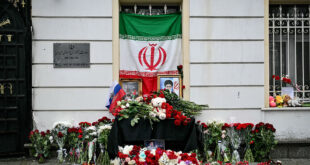Police were on patrol in Tehran on Thursday on alert for any more violent protests over the introduction of petrol rationing in Iran, the world’s fourth largest oil producer.A dozen petrol stations were set ablaze in violence that erupted late Tuesday and angry motorists queued for hours throughout Wednesday to fill up their tanks after the government’s sudden announcement.
But on Thursday, state-run television said the streets were calm and no further trouble had been reported despite long lines of cars still waiting at the pumps.
“The situation in the city is calm and the police are patrolling the city’s main roads and squares,” Tehran metropolitan police spokesman Mahdi Ahmadi was quoted as saying by Iran’s energy news agency Shana.
“Thank God there was not any report of any kind of unlawful act in Tehran last [Wednesday] night.” Iran said the rationing is aimed at curbing huge consumption in a country where a litre of petrol is now just 10 cents, less than a comparable amount of mineral water, thanks to massive subsidies.
The head of the state-owned National Iranian Oil Refinery and Distribution Company which is in charge of supplying petrol stations nationwide, urged Iranians not to panic buy.
“We are asking people to keep their cool since there is petrol for all,” Mohammad Reza Nematzadeh said on state television. Motorists have been venting their anger over the rationing move, which came into effect just hours after an official announcement, with some protesters shouting slogans against Ahmadinejad. It was the first such open outpouring of anger since President Mahmoud Ahmadinejad took office in 2005, although criticism has mounted in some economic circles that his policies were fuelling inflation and hurting the poor.
“Petrol Riots” was the headline on the moderate Kargozaran newspaper.
Under the rationing plan due to last four months initially, private cars using petrol would be limited to 100 litres of petrol a month while those using petrol and liquefied gas would only be allowed 30 litres.
The hardline Kayhan newspaper, a staunch supporter of President Mahmoud Ahmadinejad’s policies, hailed the rationing move and blamed a “petrol smuggling mafia” for the violence.
“Petrol rationing means people can enjoy public treasury money more justly,” the paper said.
“The current government is paying the price of the previous governments negligence in tackling the petrol issue,” it quoted an economist as saying.
The government daily Iran quoted Parliament Speaker Gholam Ali Haddad Adel as saying that the assembly was determined to keep on with the rationing despite an effort by reformist MPs to halt the project.
A lack of refining capacity means that despite Iran being OPEC’s number two oil exporter, it had to spend $5Â billion importing petrol in the last financial year ended March.
“Paying around $10 billion from the oil stabilisation fund to compensate for the cost of importing petrol in the past two years and then submitting to petrol rationing is the mistake,” former moderate MP Hossein Marashi wrote in the Ham Mihan newspaper.
The fund was set up by Ahmadinejad’s reformist predecessor Mohammad Khatami, aiming to save oil revenues for a rainy day.
“Ten billion dollars is great deal of money for a country that is suffering from lack of investment and unemployment,” Marashi said. “If this parliament had not frozen the annual price hike for petrol we would not be facing the petrol rationing now.” Prices had remained set at 800 rials (around eight cents) for the past three years and only went up to 10 cents last month. Iran estimates that without rationing, fuel imports could reach $9.5 billion a year. It produces 44.5 million litres of petrol a day but consumption is 79 million.
 Eurasia Press & News
Eurasia Press & News



